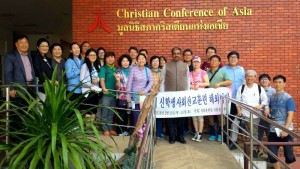Korean Theological Students and Professors Dialogue with CCA
 A group of 23 theological students and professors visited Christian Conference of Asia’s headquarters in Chiang Mai today. The students and staff were from theological seminaries in Korea such as Honam Theological University and Seminary, Busan Presbyterian University, Daejeon Theological University and Youngnam Theological University that belong to the the Presbyterian Church of Korea ( PCK).
A group of 23 theological students and professors visited Christian Conference of Asia’s headquarters in Chiang Mai today. The students and staff were from theological seminaries in Korea such as Honam Theological University and Seminary, Busan Presbyterian University, Daejeon Theological University and Youngnam Theological University that belong to the the Presbyterian Church of Korea ( PCK).
The students visited CCA headquarters as part of a Training Program for Mission and Diakonia co-conducted by the Presbyterian Church of Korea (PCK) Training Center and Diakonia Ministry of PCK. The group had an enlightening dialogue session with CCA’s General Secretary and staff about ecumenism, ecumenical movement, Diakonia and mission of the Church in the context of Asia.
“Inter-denominational dialogue and unity of the churches alone are not the main focus of ecumenism, but the oneness of humanity and unity in the entire household of God should be the principles of ecumenism. The tendency to create denominational identity often hinder Church unity and divert the attention of the real goal of ecumenism, the oneness of all God’s creation”, told Dr. Mathews George Chunakara, General Secretary of CCA to the group during the dialogue.
In response to questions on Diakonia and mission of the Church, CCA’s General Secretary added that, “authentic Diakonia should involve more than the giving of money and engaging in charity. Diakonia should be prophetic in terms of reaching out all those who suffer, accompanying them while striving for justice and human dignity. The Church has a responsibility to constantly be engaged in prophetic Diakonia, although the road ahead might be painful.”
Korean churches’ aspirations for a peaceful reunification of the Korean peninsula, especially peace and security in Korea and future ecumenical advocacy strategies were also discussed during the meeting.
The group will also be visiting the Diakonia office of Church of Christ in Thailand in Chiang Mai and the Maleah Refugee Camp in Mae Sot before going back to their home country.










